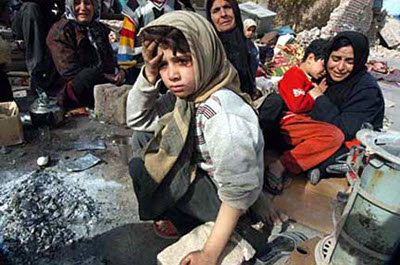Thirty per cent of Iran’s population are suffering from poverty and hunger
NCRI/Wednesday, 24 August 2016
Gulf news published an article today August 24, 2016 titled: “Iran’s abject poverty amidst all its riches”
In this article Mohammad Al Asoomi, in his opening paragraph, after mentioning that “Thirty per cent of Iran’s population are suffering from poverty and hunger …” expertly defuses the hypocritical narrative used by Iranian regime, stating: “This is not a statement issued by the Iranian opposition group known as the Mujahideen Khalq Organisation (MEK), nor by other Iranian organizations abroad. Or for that matter by any Arab body. It is an official statement issued last week by Ali Akbar Saari, attached to Iranian health ministry,”
The statement has angered ordinary Iranians, who see tens of billions of dollars’ worth of oil revenues getting wasted in financing terrorist organizations or in wars that Iran has nothing to do with. How can one imagine such a high percentage of poor in a country rich in natural resources, particularly in oil and gas.
Iran produces about 4 million oil barrels a day, more than half of which is exported. It is considered one of the world’s three largest gas producers and exporters.
Raising this question is confusing, but will go away when we gain awareness of the economic approach and corrupt economic management embraced by the government. The payroll scandal that toppled many high-profile officials within the regime is merely one example of corruption and mismanagement.
It was expected that the nuclear deal between Iran and the P5+1 group of world powers would improve economic conditions in the republic, but this has not happened. This can be attributed to many reasons, most notably the influence of the mullahs and other power centres who share the gains resulting from the signing of the deal.
As the Iranian regime and its Supreme Leader insist on a hostile approach towards neighbours and wasting the country’s fortunes to serve illusive ideological, sectarian and chauvinist ambitions, the people will continue to suffer. The proportion of poor, hungry and the unemployed has already reached a high of 30 per cent, and will continue to rise among the youth specifically.
The greatest mistake committed by Iran is its policy of indulgence in Arab domestic affairs and its plans to expand the sphere of influence beyond its own borders. Iran does not understand that Arab policies look like the Empty Quarter’s sands, which can swallow up foreigners unfamiliar with the Arab nature, notably Iranians who have yet to understand how dangerous its interference in Arab domestic affairs could be.
No doubt, the obstinacy of Iranian clerics and leaders will inevitably lead to more losses and further economic deterioration and waste of wealth in absurd wars. Iran wasted billions in funding interventions in Syria, Lebanon, Iraq and Yemen, and financing terrorist organizations in the Arabian Gulf and Shiite campaigns in Africa. All these funds have vanished to no avail, and the Iranian people paid dearly.
On the other side, the Gulf countries have managed to safeguard their security, thanks to the fusion of the people and its leadership. In Yemen, the signs of victory looming over the horizon can be seen.
In Syria, the final decision will be determined by Washington and Moscow, while not a single force can decide the fate of Lebanon because it can be determined only by national consensus.
So, is there a sane man among these religious leaders, including the Supreme Leader, who has the courage to think deeply, objectivity and logically to be able to solve the equation of oil and poverty? Can they move on from fanaticism, sectarian ideology and odious chauvinism to raise the living standards of their people and leverage their natural resources for development?
Yet, we do not think so because the regime consists of power centres, mostly from the clergy whose interests are strongly attached to such a sectarian approach, without which they cannot continue to accumulate their fortunes while disregarding peoples’ suffering.
This apparently means that there is only one way for salvation that can solve Iran’s equation of oil and poverty as called for by the Iranian opposition’s conference in Paris last month. Tehran can play a positive developmental role that can be of benefit to its own people and neighboring nations through bilateral cooperation and joint projects based on mutual interests.
But Iran’s extremist totalitarian regime, which seeks to dominate and expand its influence, will not do so.






















